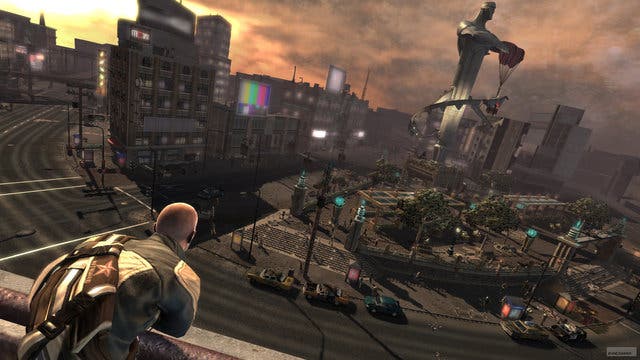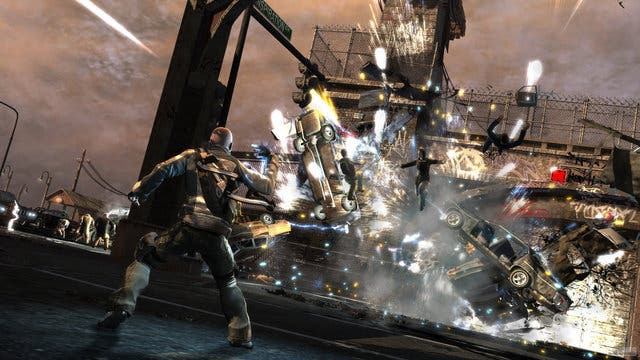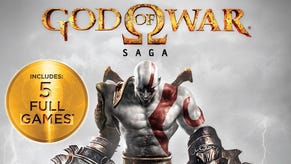InFamous
Graphic. Novel?
You can whine all you like about the fact 99 per cent of games are the same nowadays, about how they're all about shooting monsters into bloody messes in post-apocalyptic American cities. I spent 99 per cent of E3 week doing just that. But are developers simply being lazy? Or are they just giving gamers what they want?
Take InFamous. It's set in a post-apocalyptic American city, so that's one box ticked. However, it's not about shooting. You play an Cole McGrath, a man with the power to absorb, control and discharge electricity. He can use it as a weapon, firing lightning bolts down from the sky. He can also use it to heal people - restarting their hearts with a burst of power like a human defibrillator.
In this particular post-apocalyptic American city, there are no monsters. True, some of the inhabitants have mutated and gained new abilities like Cole. But most of them are just normal people who are exploiting a situation where normal laws have ceased to exist. For many of them this means stealing, raping and murdering, with no fear the police will intervene - they're "too dead or too chickens***", as the trailer puts it. As the game progresses, you must decide whether to join the free-for-all and look after yourself, or do what you can to help the helpless. Yes, whether to use your powers for good or evil.
As creative director Nate Fox has been explaining over the course of a 20-minute demo, InFamous is about what happens when an ordinary man becomes extraordinary. It's about what it feels like to possess unique and immense powers and about learning how to control them. It's about the what happens when a city descends into chaos, what takes priority when it's a question of morality versus survival, and what emerges when human nature is no longer bound by social constructs.

So you can imagine Nate Fox is a bit disappointed by the first question from a journalist at the end of his demo: "That looked really tame. Is the finished game going to be more violent?"
He's even a bit stunned. "Are you kidding me?" Fox replies. "He electrified a guy! He pulled lightning out of the sky!"
"Yeah," says the journalist, "But what about exploding heads and torn limbs and, you know, all that stuff that's cool for the kids these days?"
Fox manages not to sigh. "We are aiming at a teen rating. We're not going for as much gore as we can. Hopefully that will not get in the way of our objective, which is to make the player feel like a modern-day superhero." And besides, "You saw in our intro cut-scene we said 'sh**' twice. So that means we're edgy, right?", he adds with a smile.
The phrase "modern-day superhero" is used frequently by Fox, but what does it mean? Someone who can operate Sky+ telepathically, perhaps, or complete a trip to Ikea in under six hours without rowing? "'Modern-day superhero' is the phrase that I use to make all decisions. We want to make you feel like that's what you're becoming," explains Fox. "That means we have to deliver things like powerful abilities, a slate of villains who are iconic and also powerful, a storyline which is mysterious in nature, so you keep going."

Cole doesn't wear a cape, a big shiny belt or anything constructed from lycra - "Because that didn't seem like something that would feel very real." He's an ordinary man whose life is turned upside down when a mysterious blast destroys six blocks of his home town, Empire City. The voiceover to the extended trailer we're shown hints at other characters - "Trish lost her sister, almost lost me" - and the after-effects: "plague, rioting, theft, rapes, a civilisation committing suicide". The Federal Government looks at all this and decides to chuck said civilisation more razor blades and a spare rope; Empire City is quarantined from the rest of the world, leaving its citizens imprisioned amongst the chaos.
That includes Cole, who was previously an urban explorer - one of those types who goes round breaking into disused buildings and old sewers for a laugh. He has developed excellent climbing and acrobatic abilities, and is great at shimmying up telephone poles, jumping between ledges, leaping across rooftops and so on. And there are plenty of poles, ledges and rooftops to make use of.
"While this is is an open-world game, it's also open in three dimensions. You can move and explore however you want," says Fox. "We have a rule in-house: if you think you should be able to climb on it or interact with it, we let you do it. We've all played Assassin's Creed and it's really awesome that if you see it you can just keep climbing it, right? So if you see a ledge, if you see a pole, get your fingers in there and you can climb. It's very difficult to stick to that rule, but it's worth it."




